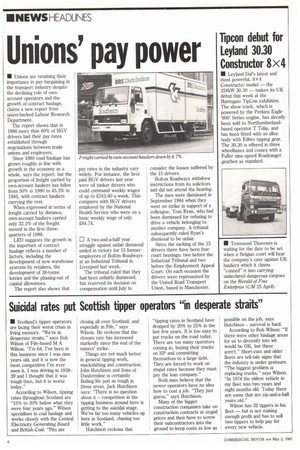Unions' pay power
Page 8

If you've noticed an error in this article please click here to report it so we can fix it.
• Unions are retaining their importance in pay bargaining in the transport industry despite the declining role of ownaccount operators and the growth of contract haulage, claims a new report from union-backed Labour Research Department.
The report shows that in 1986 more than 60% of HGV drivers had their pay rates established through negotiations between trade unions and employers.
Since 1980 road haulage has grown roughly in line with growth in the economy as a whole, says the report; but the proportion of freight carried by own-account hauliers has fallen from 50% in 1980 to 45.3% in 1985, with contract hauliers carrying the rest When expressed in terms of freight carried by distance, own-account hauliers carried only 32.2% of the freight moved in the first threequarters of 1986.
LRD suggests the growth in the important of contract haulage reflects a number of factors, including the development of new warehouse systems by retailers, the development of 38-tonne lorries and the phasing-out of capital allowances.
The report also shows that pay rates in the industry vary widely. For instance, the best paid HGV drivers last year were oil tanker drivers who could command weekly wages of up to £243.60 a week. This compares with HGV drivers employed by the National Health Service who were on a basic weekly wage of only £84.74.
o A two-and-a-half year struggle against unfair dismissal ended in victory for 15 former employees of BoltOn Roadways at an Industrial Tribunal in Liverpool last week.
The tribunal ruled that they had been unfairly dismissed, but reserved its decision on compensation until July to consider the losses suffered by the 15 drivers.
Bolton Roadways withdrew instnictions from its solicitors and did not attend the hearing.
The men were dismissed in September 1984 when they went on strike in support of a colleague, Tom Ryan, who had been dismissed for refusing to drive a vehicle belonging to another company. A tribunal subsequently ruled Ryan's dismissal to be unfair.
Since the sacking of the 15 drivers there have been four court hearings; two before the Industrial Tribunal and two before the Employment Appeal Court. On each occasion the drivers were represented by the United Road Transport Union, based in Manchester.




























































































































